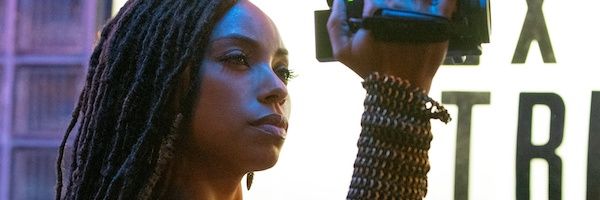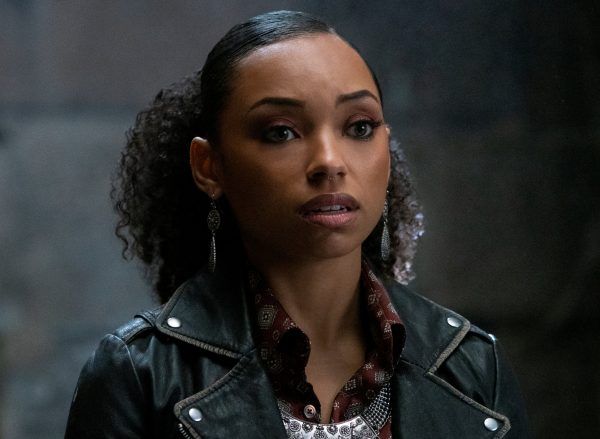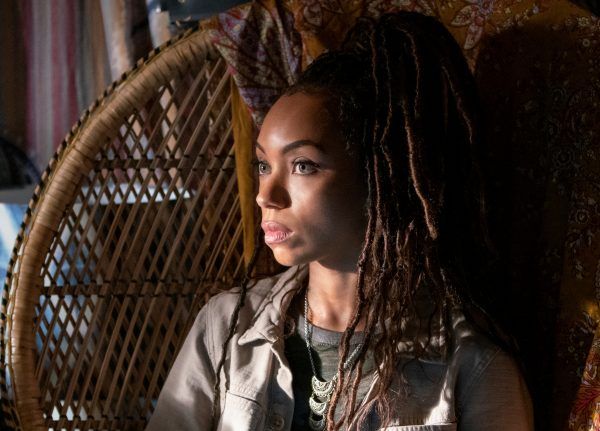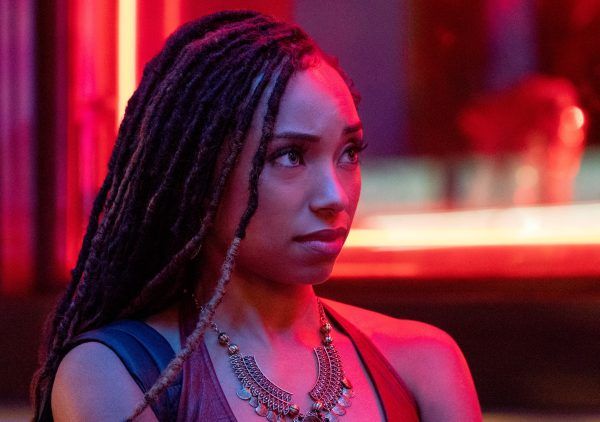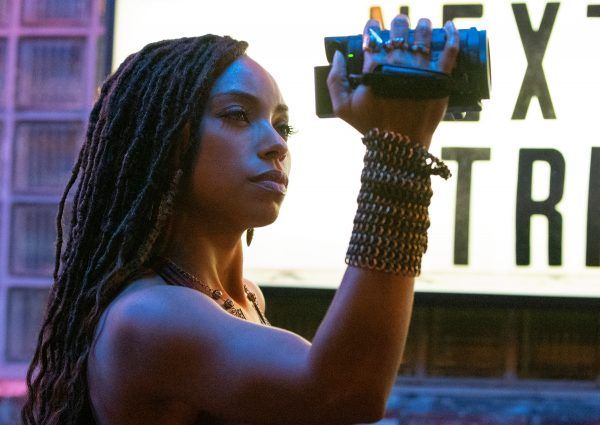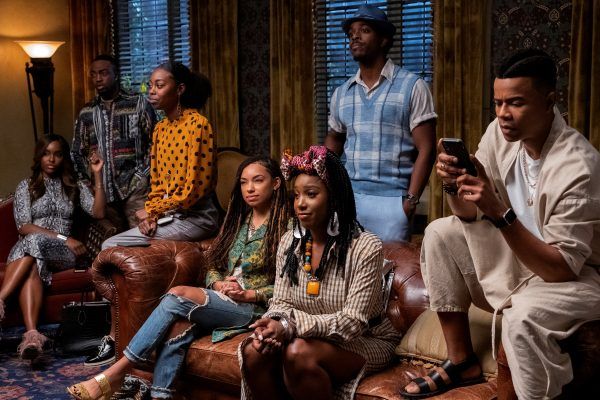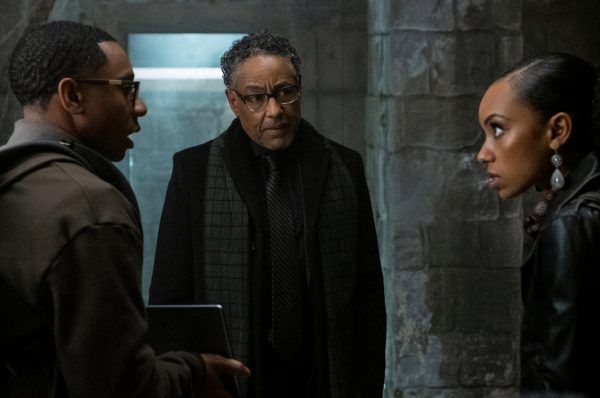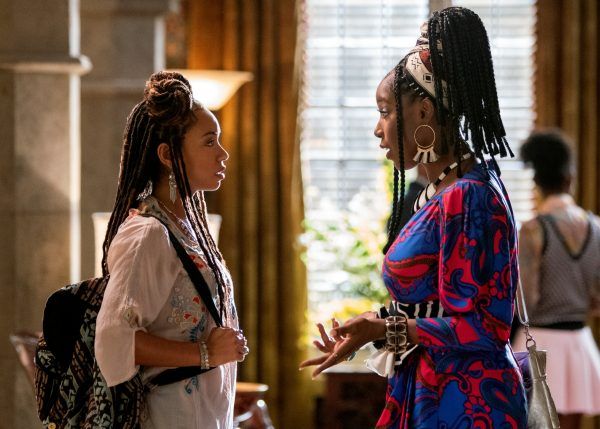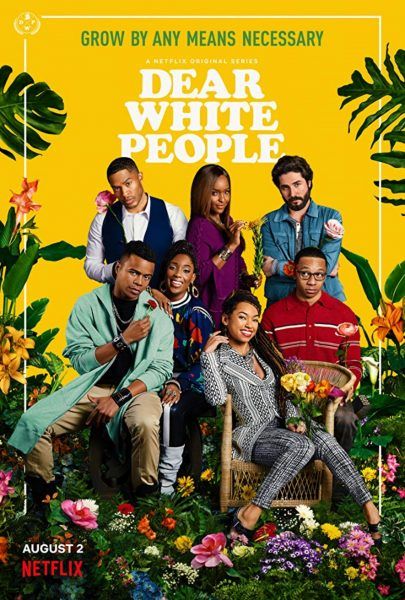*Be aware there are spoilers discussed for the entire season*
In Vol. 3 of the Netflix original series Dear White People, from show creator/writer/director/executive producer Justin Simien (who also wrote and directed the original film), the students at Winchester University are still on their journeys of self-discovery, as they try to figure out their place in the world and what they want for themselves. While the story is still biting and witty in its social commentary, and contains some of the great pop culture references its become known for, it’s also expanding with more overlapping stories among its strong ensemble of characters and actors.
During this 1-on-1 phone interview with Collider, actress Logan Browning (who plays the show’s most outspoken hero, aspiring filmmaker Sam) talked about how much she enjoys the fan reaction she gets from being a part of Dear White People, the show’s evolution over three seasons, working with show creator Justin Simien as a scene partner (he plays a couple different characters in the season), what it was like not to be hosting the "Dear White People" radio show anymore, her favorite moments this season, whether she gets nervous about the way they poke fun at real people, getting to work with Giancarlo Esposito (who’s previously lent his voice to the Narrator), and the possibilities for Season 4. She also talked about why she was attracted to the Netflix original film The Perfection, her desire to play people whose stories are untold, and the TV shows that she’d love to do a guest spot on.
Collider: I would imagine that this show brings a lot of fan reaction, especially with how real these characters feel and how easy it must be for a lot of different people to find something that they can relate to. What’s it like for you to hear from fans, especially the ones who see your character as representing their voice?
LOGAN BROWNING: I love it. I get it from all angles. I get it from being in person, and I get it online, through a direct message or on Twitter. It means a lot to me because I remember watching Dear White People, the movie, and seeing myself in Tessa Thompson’s character of Sam, at that time. For me, it wasn’t that I was necessarily an activist, at the time. It was just something about the way she existed in the world, unapologetically. And I feel like people see that in Sam. She’s a bold young woman, in terms of her voice, her style and her relationships. And then, you add on the fact that she’s such a powerhouse, with such a strong mind when it comes to her activism, and I love it because I relate to it. I see myself, in the character. So, any time other people can see that, I just feel like this show is doing them a solid service. Most of the time, people are forced to see themselves in characters that often look nothing like them, which can be refreshing sometimes, but can also be frustrating, if you never see a character who looks like you.
I would imagine it’s both inspiring and validating, when you actually see a character that you identify with, that does look like you.
BROWNING: Yeah, you’re like, “Whoa, wait, this is a strange new experience for me. I feel them, and I look like them. That’s crazy!” But I also enjoy the people who feel like they relate to Sam, who don’t look like Sam, because that’s the point. That’s the entire point.
This is a show that’s had a huge evolution, from its first episode and now through the end of Season 3. Did you know that it would have the type of growth that it’s had, and is still having? Is that something that you’d hoped for and that you’re happy to see playing out, or did you have an idea that you would get to this point with it?
BROWNING: I’m the kind of person, in my life and in how I approach art, where I just flow, from moment to moment. I don’t think I ever anticipated how the show would do, once our first season aired. For me, I was in the moment of actually filming and participating in what we were creating, and I remember being really surprised at how big it was, even in its first season, because that’s not why I was a part of it. What is so cool about Season 2 and 3, with the show, is how Justin has really able to expand on these characters, and show us new characters that seem to be really vibrant from the sideline and that audiences are very curious about. He’s able to go in-depth into their stories more, and I think that’s brilliant. As a viewer, I appreciate that because we’ve been taught that the format for a show or a film is to have a singular protagonist, and to break that form is the way of the future because that’s not how we live our lives. Even when I walk through my life, as my own protagonist, there are other people in my life, who have strong storylines that I’m engaged in and curious about, and that’s the way our content should be.
And it’s really the perfect setting to do that because there are so many people on a school campus that it just seems like a great way to explore so many different voices, points of view and personalities.
BROWNING: Yeah. I think Justin’s whole point of making it into a show is that, as a film, it worked, but there was room for so much more exploration and growth. I always think about what it would be like to see any of the students outside of that microcosm of the school. We do follow their characters and how they’re able to develop their personalities in the world that has been built for them, in those four walls, but I’m always curious about what those characters would be like, outside of it all.
It’s also the perfect marriage of great writing and great performances, when you feel like those characters do have a full life when we’re not seeing them.
BROWNING: Right. And now the show is able to service that more, with a lot of the characters that it didn’t feel like you got to see on the screen. It’s also frustrating when you can feel that these are full people, but you don’t get to see it. I can imagine that, especially if you relate to a character and you’re not feeling like your story is being fully told in front of you, how much of a relief it must be to finally see that, specifically with the Joelle (Ashley Blaine Featherson) character and the Reggie (Marque Richardson) character, and Al (Jemar Michael), Kelsey (Nia Jervier) and Brooke (Courtney Sauls). This season, there’s just so much more content from those characters.
Obviously, Justin Simien is very hands on and very involved with the show. He’s a producer, writer and director on it, and now he’s playing more than one character. What’s it like to work and collaborate with him, and how is he, as a scene partner?
BROWNING: I love collaborating with Justin. In Season 1, he was very much like, “Look, this is my baby. I’ve created it. I know what I wanna make, and I’m here to do that, and do it in a fun way. The end.” After that, he was very open to the idea that these characters are no longer just his, but they’re also the actors’ who are playing them and the other writers’ who are contributing. He’s always been very collaborative. And then, as a scene partner, he’s a lot of fun. Justin wears so many hats, obviously, but when it comes time for him to play his character, it’s like a kid at recess. He’s just able to completely fall into it and not have any other responsibilities, and you can see how much he loves it. And he likes stay in character, which for me was not good because he was giving me shit the whole time. But he’s very talented, and I think he really had a lot of fun doing it.
What did you most enjoy about the journey that you got to take with Season 3, and how do you feel that Sam really grew the most, this season?
BROWNING: Sam really got to take a step back. Sam was always leading the movement and leading the charge, and this season, you see where she’s pulled in that direction. You can see that it’s a part of her personality to always be pulled towards change and towards the movement, but there’s also that struggle and fight to take care of herself. She knows what it’s done to her in the past, and she’s enjoying the moment, enjoying her relationship with Gabe, and enjoying her process of filmmaking, which is the reason that she’s at the school, in the first place. I just think that it grounded and humanized her, in a way that sometimes you’re not able to see through her in the radio station.
Was it weird to have that taken away, after two seasons of being in the radio station, doing the radio shows? Did it feel very different not to have that?
BROWNING: Yeah, I had a relationship with the radio station. There’s that monologue in the radio station, that I say at the end of Episode 1 in Season 1, that was my audition for the show, and so, I had a deep relationship to that. It made me feel powerful, it made Sam feel powerful, and that was the crux of a lot of the storyline, so to be away from that, there was definitely a feeling there. I remember one day on set, towards the end of the season, when I walked into the radio station and I just cried because I missed it. It was like an old friend, but I also cried because I got to take a break from it. There were a lot of emotions that we filmed in that radio station, and I remember being very emotional about that. It’s also really weird because that’s a place that a lot of our crew members like to take naps during lunch, so I was crying while someone was trying to rest, but it was fine. It was emotional stepping away from it, but I’m glad that was the trajectory of the character because it’s realistic.
There are so many fun, funny, heartfelt and memorable moments, throughout the series, and this season is clearly no exception. I personally loved the moment when Sam realizes that she’s in the middle of it with Joelle and Reggie, and she tries to sneak out the door unnoticed. What were the stand-out moments for you?
BROWNING: This season, there were a lot of added improv moments that stayed in, that I thought were really funny. There’s a moment where Sam and Joelle are supposed to be in their room studying, and towards the end of the conversation, Sam asks Joelle, if she’s the Sasha and Malia of their Barack and Michelle, and that was completely improv. The fact that they keep kept it in was hilarious to me. Or when Sam gets jealous of some girl who says bye to Gabe, that was completely improv. That actress decided to just say bye to Gabe, and I was like, “Whoa, whoa, whoa, wait a minute,” and had a visceral reaction as the character. So, all of the improv is memorable. And doing the Dear Black People was very memorable because it was just off the chain. We were all like, “What the hell are we doing, Justin?” And we were very confused, for a long time, about the format of that. We really did not understand. And I think it took me being done with the show and watching it to be like, “Oh, now I think I get it,” but we were struggling.
You also deliver jokes that are pop culture related and that are about people who are living. I loved the joke that was made about The Handmaid’s Tale take-off series, The Nursemaid Diaries, and about how it’s lead actress is in a cult. Do you ever worry, when you say things like that, how it’ll be received by the actual people that you’re poking fun at? Are you ever afraid that, if you’re at a party or event with one of those people, that they might say something to you about it?
BROWNING: All the time! I’m always like, “Justin, why are you making me say this?” He’s like, “Say what? What are you talking about?” He always plays coy. I always get nervous about that, but at the end of the day, our show is a satire. Everything is in jest, and being able to poke fun at other people and yourself is how we all get through, in life. We’ve had people confront us, personally, about some of the things that we’ve said, which honestly just means that I get to meet people I admire, so I don’t mind it. I’ve gotten to have conversations with people I’ve really liked. All the people that we will say crazy things about are, most of the time, people that we’re fans of, so it’s worked out in my favor. I actually religiously watch The Handmaid’s Tale and I love Elisabeth Moss, so if she ever runs into me and is like, “Why did you say that joke,” I’ll be like, “Yes, now we’re best friends.”
I also love that you got to spend some time with Giancarlo Esposito, this season, and that we got to actually see the Narrator in physical form. How was it to work with him, and to have that role actually brought to life?
BROWNING: That was really cool. I remember when we ended Season 2 thinking, “Oh, my god, the Narrator is now in the flesh. What does this mean?” I also really geeked out at the fact that DeRon Horton] and I would get to work with Giancarlo. He is honestly the best. He’s so sweet, so hardworking, and so smart and caring. I’m always trying to soak in information, when I work with any really wonderful actor. He’s fun. He has a serious quality about him, but he also has a light-hearted spirit. It really fit in with the way that we work, which is that we take the work very seriously, but we also have a lot of fun. He fit in very well with Justin, DeRon and myself.
I’m always on pins and needles, waiting for the renewal announcement for this show. With every season, I wait to hear about whether or not we’ll get to see another season. So, if you do get to do more episodes, has there been talk about where things would go next? Are there things that you would still like to learn about your character?
BROWNING: We do talk about it, and I know that Justin has a vision. He always does. In a general sense, I think a fourth season would be really cool because I look at it as, these students have been on your screen for three years, and when I think about college, I always think about senior year and having that fourth year. A lot of the students are juniors, in the show. So, I don’t know, but I think that it could go a lot of places. I would love to be able to see more about Coco and Troy, and how they were together, then apart, and then together. I think about all of the relationships that have changed, over the course of the series. What I’m mostly interested in is those relationships because, at the end of the day, all the activism and the movement stuff is happening, but the relationships are why you really show up because they’re authentic. Those are the kinds of things that I’m always interested in.
While this show certainly gets a lot of conversation going, The Perfection, which you also had on Netflix, seemed to get a lot of conversation happening, as well. When you’re reading projects, what are you drawn to? Are you drawn to stuff that feels like it’s certainly going to have a reaction from people?
BROWNING: Not necessarily. I guess it just turned out that way. I’m drawn to interesting stories that I’ve never seen before. With The Perfection, I read that script and I had never seen anything like it. I’d never seen a person who looks like me, playing a character like that. And so, that’s why. When I read the script, it allowed me to place myself in the story. There was nothing about the way that the script was written that felt like me, Logan, and all of my descriptions weren’t included in the character. I just was really able to insert myself. Sometimes, I hope the work that I do does push and move a needle into the direction of conversation, understanding and empathy. It did matter to me with The Perfection, when I read it, that the subject matter was pertinent and sensitive, and had something to say.
Is there a type of role that you’d love to do, or a character from either real life or from some sort of source material that you’d love to get to play?
BROWNING: I’m always hoping to do a biopic, in the future. I feel these things in my gut, and so, I know that, at some point in my life, I’m gonna play a real-life person. One of the things that I’m interested in playing is a character that we don’t know about. I don’t necessarily need to play someone who we already know a lot about, and could Google and learn a lot about. Similar to when we all saw Hidden Figures and were so frustrated that we, or at least that I, personally, had never really heard of those women before, and maybe I would have been an astronaut, if I had heard of these women while I was growing up. So, I do just want to play people whose stories are untold. That’s really what I would be drawn to.
Is there a current TV series that you’d love to do a guest spot or a guest arc on?
BROWNING: I just started binging different things, and I really like Euphoria, but I don’t think I could be on it. It’s really emotionally taxing. But, I’d love to do a really cool limited series. I’m about to start watching Succession, and I hear great things. I want to do more sci-fi. I really love sci-fi. I want to do something that doesn’t feel so far-fetched and that feels like the real world, but is a little dystopian and a little sci-fi. I’d be into something like that.
Dear White People Vol. 3 is available to stream at Netflix.

